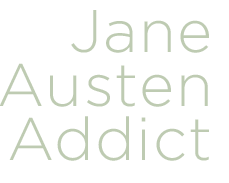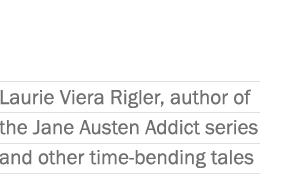In the next few days, look forward to the release of a real treat. Viera Rigler’s novel begins with a delightful little scene (though told in present tense, which usually annoys me) in which our Regency era heroine awakes in Los Angeles, circa 2009. Her initial experiences with an alarm clock and the TV are highly amusing, as is watching the various characters come to varying degrees of understanding about why this young woman thinks she is Jane Mansfield, whereas they “know” she is their friend, Courtney Stone, whom readers last saw in the other half of this soul/life swap. It’s a great idea (don’t you wish you came up with it?), and the story is quite pleasing.
At first, we are confused as well. Jane remembers a riding accident; her friends remember Courtney getting a concussion by hitting her head on the bottom of a pool. Okay . . . but why did this switch occur? The answer to that question takes the tale to answer, but it becomes clear fairly early that neither heroine was really happy in her own life. When Wes (the cute, concerned, citrus-scented guy taking care of “Courtney”) tells her that it is her life she is living, those words are refreshing to her, even if not quite true. Though she is often bewildered and occasionally terrified by what she learns in the modern world, Jane also grows excited by the prospects of commanding her own “car”riage, making her own living, having her own apartment, and making the multitude of decisions that come the way of every modern American woman.
Perhaps the most pleasing surprises for Jane center around her favorite writer: she discovers several “new” works that she immediately reads, and the BBC Pride and Prejudice. Enough for any heroine, certainly. My favorite line, in fact, appears just as Jane is trying to reconcile her fear and frustration with her excitement. She says she knows “that any place where there are six novels by the author of Pride and Prejudice must be a very special sort of heaven.” How could one say it better?
Viera Rigler uses common Austen knowledge to help the reader sort through what could be unclear information. There is some suspicion around Wes’ past behavior, but when he calls Courtney’s cell phone, Jane sees Colin Firth’s picture. Lesson: trust him. He’s the good guy. Frank, on the other hand, is described with the same turn of phrase Austen uses to describe Wickham. Check! We know how to interpret him as well. It’s like Lynn Batten always advises us: if we keep a list of Jane Austen characters as we travel through life, we will, at some point or other, meet everyone on the list in “real” form. That’s what happens to Jane, but even still, she needs some help sorting through the information. For that, she relies on her friends, some more than others.
The story made me laugh. The description of our world by someone who could easily have stepped from the pages of one of Austen’s novels sheds light on details we hardly notice anymore—the huge platters of food served to us in restaurants, the written request to be one’s friend (on Facebook—such a clever little insertion without directing naming the site!). Above all, the story makes us remember to value the modern world even as we bemoan the loss of Regency manners. We forget sometimes, when we watch the films or reread the novels, how few were the choices both men, but especially women, had. We forget that open expression of one’s feelings, let alone affections, was discouraged. And we forget to live in the present, and to make every moment right now count. Thus, Rude Awakenings is more than a sheer pleasure to read; it also offers us a valuable lesson, if only we would listen to it over the sounds of “Mr. Beveridge’s Maggot” in the background.
June 25, 2009
<< Back

